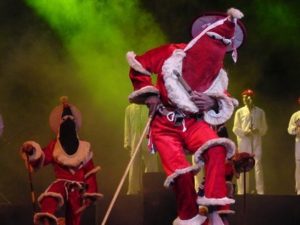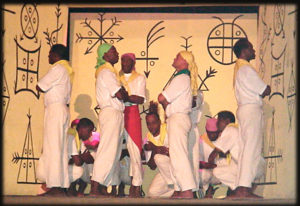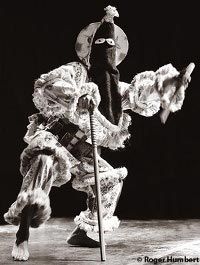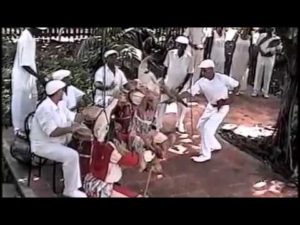This kind of society is unique in the American continent. This association was founded in the first decades of the 19th century, a hostile moment for the slaves and the black persons. The form they found to avoid the repression and the harassment was a mutualistic religious group.
In Cuba, those persons belonging to the secret masculine society Abakuá are known as abakúa or ñañigo.
The Abakuá members derive their culture from the Efik and Efo of the Cross River region in Nigeria, which Cubans call Carabali. They are organized in a set of over 150 potencias (lodges) located mainly in Havana, Matanzas, and Cardenas.
The people of Big Qua Town in Calabar, the capital of Cross River State, Nigeria, are known as the Abakpa, the likely source for the name Abakuá. Big Qua Town is the home of the president of the Calabar Mgbe or Ékp.
The first society composed by white persons was founded in the early 19th century and it was named Akanarán Efó Muñón Ekobio Mucarán. The founder was Andrés Facundo de los Dolores Petit, well known by his contribution to the Regla de Palo, and the elaboration of the conceptual body and ritual of the Kimbisa variant.
The antecedents of the abakuá or ñañiguismo are in the secret society that existed in Nigeria, Calabar. Its organization and content have the roots in the African legend that tells the story of the violation of a secret by a woman: the princess Sikan. She found the sacred fish Tanze and reproduced the roar in the sacred drum Eku.
The ñañiguismo can not be separated of the African believes about the existence of ancestor (spirits), thats why in all the ceremonies they are called to guaranty the development of the ritual according to rigorous liturgical norms. Its symbolic representation is the ireme or diablito.
All the activities of the cult are made in the temples. In all the rituals are used lines and graphics known as Ekeniyo which are an ideological –graphical system of signs to immobilize and attach the representation of global events. These symbols are painted with yellow and with yeast and they are divided in three categories: the Gandos, the Signs or Anaforuanas and the Seals.
The ñañigismo has several hierarchies. The Indisime is the applicant to enter into a potencia, the Obonekué is an already initiated man. The Plaza is a everlasting hierarchy with a relevant position in the juego. This person is in charge to preserve and to make follow the norms and ritual and social principles. The Iyamba, Mokongo, Ekueñón, Nkrikamo and Nasako have the title of Plaza. Only men are admitted in the secret society Abakua.
If you ask among its members about the concept of Man they will reply: ” It is not about those who are not homosexual but, those who reflect the purest dignity of the human beings, laboriousness, fraternity, joy, rebelliousness against injustice, and follower of the moral codes established by the ancestors, the pioneers of the Abakua; it is the good father, the good son, the good brother, the good friend.
The Abakuá gave us the rumba, one of Cuba’s principal musical traditions. The Calle family, for example, is of Efo origin and is said to have invented the guaguanco, a type of rumba.
We can also note that the Carabali culture in Santiago (cabildos) and in the center of Cuba is also derived from Calabar, Cross River State, Nigeria. The name Carabali is derived from the slave port of Calabar, as distinct from the Karabali people of the Niger Delta.
LA SOCIEDAD SECRETA AFRO-CUBANA.ABAKUÁ O ÑAÑIGO.
Este tipo de sociedad es única en el continente americano. Esta asociación fue fundada en las primeras décadas del siglo XIX, un momento hostil para los esclavos y las personas negras. La forma que encontraron para evitar la represión y el acoso fue un grupo religioso mutualista.
En Cuba, las personas que pertenecen a la sociedad secreta masculina Abakuá son conocidas como abakúa o ñañigo.
Los miembros de Abakuá derivan su cultura de Efik y Efo de la región del río Cross en Nigeria, que los cubanos llaman Carabali. Están organizados en un conjunto de más de 150 potencias (lodges) ubicadas principalmente en La Habana, Matanzas y Cárdenas.
La gente de Big Qua Town en Calabar, la capital del estado de Cross River, Nigeria, es conocida como Abakpa, la fuente probable del nombre Abakuá. Big Qua Town es el hogar del presidente de Calabar Mgbe o Ékp
La primera sociedad compuesta por personas blancas se fundó a principios del siglo XIX y se llamó Akanarán Efó Muñón Ekobio Mucarán. El fundador fue Andrés Facundo de los Dolores Petit, conocido por su contribución a la Regla de Palo, y la elaboración del cuerpo conceptual y ritual de la variante Kimbisa.
Los antecedentes del abakuá o ñañiguismo se encuentran en la sociedad secreta que existió en Nigeria, Calabar. Su organización y contenido tienen sus raíces en la leyenda africana que cuenta la historia de la violación de un secreto por parte de una mujer: la princesa Sikan. Ella encontró el pez sagrado Tanze y reprodujo el rugido en el tambor sagrado Eku.
El ñañiguismo no puede separarse de las creencias africanas sobre la existencia de antepasados (espíritus), por eso en todas las ceremonias están llamadas a garantizar el desarrollo del ritual según rigurosas normas litúrgicas. Su representación simbólica es el ireme o diablito.
Todas las actividades del culto se hacen en los templos. En todos los rituales se usan líneas y gráficos conocidos como Ekeniyo que son un sistema gráfico ideológico de signos para inmovilizar y unir la representación de eventos globales. Estos símbolos están pintados de amarillo y con levadura y se dividen en tres categorías: los Gandos, los Signos o Anaforuanas y los Sellos.
El ñañigismo tiene varias jerarquías. El Indisime es el solicitante para entrar en una potencia, el Obonekué es un hombre ya iniciado. La Plaza es una jerarquía eterna con una posición relevante en el juego. Esta persona se encarga de preservar y hacer cumplir las normas y los principios rituales y sociales. Iyamba, Mokongo, Ekueñón, Nkrikamo y Nasako tienen el título de Plaza. Solo los hombres son admitidos en la sociedad secreta Abakua.
Si preguntas entre sus miembros sobre el concepto de Hombre, responderán: “No se trata de los que no son homosexuales, sino de aquellos que reflejan la más pura dignidad del ser humano, la laboriosidad, la fraternidad, la alegría, la rebeldía contra la injusticia y el seguidor de los códigos morales establecidos por los antepasados, los pioneros del Abakua, es el buen padre, el buen hijo, el buen hermano, el buen amigo.
Los Abakuá nos dieron la rumba, una de las principales tradiciones musicales de Cuba. La familia Calle, por ejemplo, es de origen Efo y se dice que inventó el guaguanco, un tipo de rumba.
También podemos observar que la cultura Carabali en Santiago (cabildos) y en el centro de Cuba también se deriva de Calabar, estado de Cross River, Nigeria. El nombre Carabali se deriva del puerto esclavo de Calabar, a diferencia del pueblo Karabali del delta del Níger.
Agencies/CubanTraditions/Various/Internet Photos/ Arnoldo Varona/ TheCubanHistory.com
THE CUBAN HISTORY, HOLLYWOOD.



 > THE AFRO-CUBAN Secret Society. ABAKUÁ or ÑAÑIGO. (Photos). <> LA SOCIEDAD SECRETA Afro-Cubana. ABAKUÁ o NAÑIGO. (Fotos).
> THE AFRO-CUBAN Secret Society. ABAKUÁ or ÑAÑIGO. (Photos). <> LA SOCIEDAD SECRETA Afro-Cubana. ABAKUÁ o NAÑIGO. (Fotos).








